The outcome of the 21st Conference of the Parties to the United Nations Framework Convention on Climate Change held in Paris from 30 November to 11 December 2015, has reinforced the reasons why women must be at the heart of decisions and mobilization to advance climate justice. This week AWID looks at some of the challenges and opportunities of integrating women into these processes.
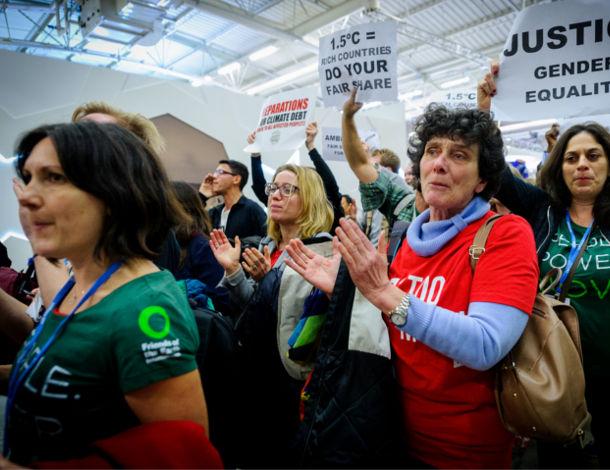
According to the UN, women and children are 14 times more likely than men to die during a disaster. Therefore, women are particularly vulnerable to climate change and experience its effects disproportionately because of their social roles in providing water, food and combustible materials to the family and caring for others; and the injustices they experience including gender-based violence, lack of access to information, etc. Women bear the brunt of climate change, but they also hold the greatest knowledge and strength for mobilizing to fight against it1. Unfortunately, their integration remains partial and incomplete, which is a major obstacle to climate justice.
COP 21: A gender-blind process
The new sustainable development agenda adopted by UN Member States last September seeks to end poverty, fight against inequalities and injustice, and address climate change. For Eleanor Blomstrom, Program Director at WEDO (Women’s environment and development organization) and Coordinator of the Women’s Major Group for sustainable development, it is important to link this new development program to the COP 21 negotiation process. In doing so, it becomes apparent that while the Sustainable Development Goals show progress in the area of gender equality when compared to the former Millennium Development Goals, the Paris Agreement is still deeply disappointing.
While COP 21 President, Laurent Fabius, committed to waging the fight for climate “for and with women” in March 2015, recognizing their key role “at the heart of national and local climate strategies and at the heart of international climate negotiations”, it is obvious that this promise has not been kept.
“The notion that gender is a cross-cutting issue does not exist within the UN. Women should be actively participating in negotiations, even beyond specific groups”, notes Hindou Oumarou Ibrahim, Coordinator of the Association des femmes peules et autochtones du Tchad (AFPAT) (Fulani Indigenous Women’s Association of Chad)2.
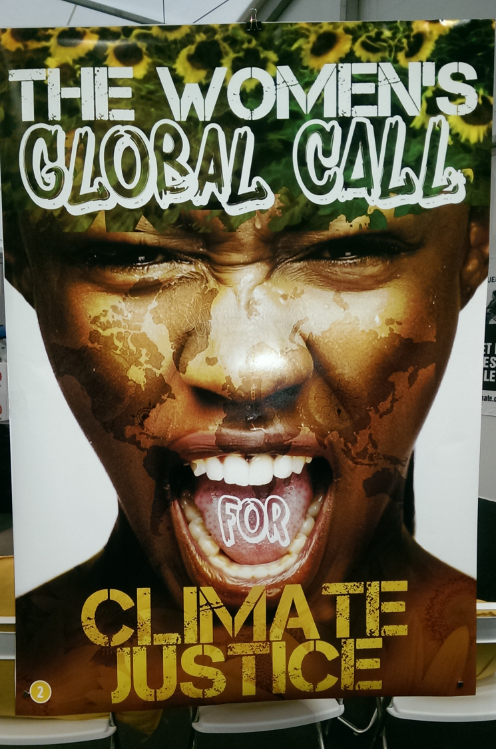
Efforts surrounding women’s integration into these processes are crucial, especially since, according to one woman who participated in COP 21 negotiations, “heads of State seem to be totally gender-blind”. Kalyani Raj, from Women and Gender Constituency, one of the nine stakeholder groups of The United Nations Framework Convention on Climate Change (UNFCCC), explains that even her group was marginalized during the negotiation process for the Paris Agreement, which led to a delayed reaction from civil society organizations regarding negotiation content. She further explains that during COP 21, “advocacy mainly took place through delegations, although some parties had recognized that civil society should have been included”.
Consequently, and despite feminists mobilizing until the very last minute, the final Agreement fails to address, among other things, the 11 Key Demands for COP21 as articulated by Women and Gender Constituency. Apart from the preamble, which has no binding or operational value, no reference is made to human rights, women’s rights, gender equality, women’s empowerment or the rights of indigenous people. Gender is briefly addressed in paragraphs related to capacity-building and adaptation, and indigenous peoples’ knowledge is also recognized in the latter. However, articles regarding the purpose of the Agreement, mitigation, loss and damage, finance as well as technology development and transfer are totally gender-blind.
“It is clear that in Paris we have not found the political will to make the Paris Agreement the platform the world truly needs to tackle this urgent challenge. We will not be silenced from telling the truth to power, to highlight the lack of ambition and injustice in this agreement.” said the Women and Gender Constituency.
This failure underscores the fundamental link between climate justice and women’s participation in decision-making and mobilization processes, as well as their pivotal contribution to the systemic analysis of climate justice.
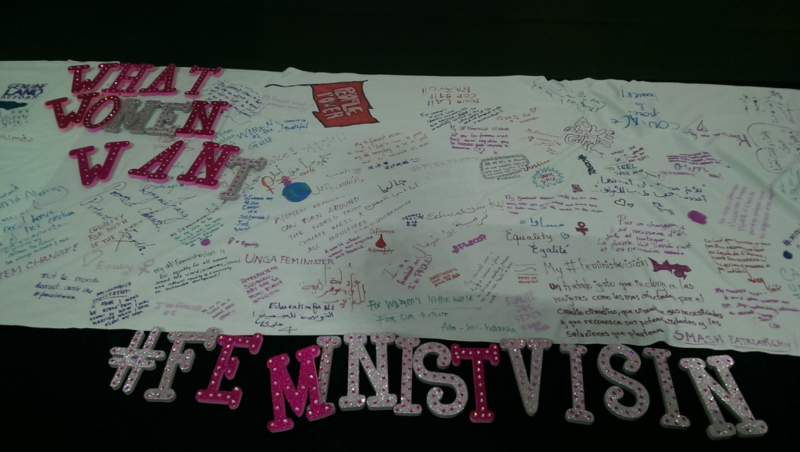
Women’s struggles are systemic and intersectional
As Claudy Vouhé, feminist, co-founder and activist with Genre en Action, suggested in her presentation during the event “Lutte contre le dérèglement climatique : les femmes en première ligne” (Fight against climate change: women in the front line) on December 1st, 2015, various aspects must be considered when mainstreaming gender into climate justice, namely: innovative analyses on cross-cutting issues that involve gender, climate change and other focal points (for example health or conflict); the matter of gender-responsive budgeting and resources allocated to women, ensuring balance between mitigation and adaptation strategies; capacity-building among women in order to reintroduce the notion of “power”; and finally, the sustainability of development as it relates to democracy. These aspects highlight the extent to which the women’s struggles for climate justice must be considered from a systemic perspective and include various areas for mobilization.
As part of the Climate Action Zone, held in parallel with COP 21, a workshop organized by the African alliance WoMin served as a reminder of the major issues underlying women’s movement-building for environmental and climate justice. At the very heart of this issue: condemning the production and consumption system that has unfair and unequal consequences for populations, and particularly for African women. As speakers explained:
“In Africa, everyone knows what climate change is. People may not know how to name the phenomenon, but they recognize what is happening to them.”
Based on a systemic ecofeminist approach, examples of women’s mobilizations for climate justice in diverse parts of the world highlight how women’s struggles correlate various issues, emphasize the intersectionality of oppressions, create alternatives in the field and demonstrate solidarity. This struggle cannot continue without building connections with other movements and actors, learning processes and critical thinking.
“An African ecofeminist approach is a vital correction to the capital-centric and patriarchy-reinforcing strategies of nearly all the country delegations to the COP 21”, noted WoMin in a statement on Paris negotiations, concluding that “The struggle against an oppressive development paradigm is, at one and the same time, also a fight against terrorism, militarisation, racism and war. This is our fight as African women; it is a fight for justice, peace, solidarity and love across the globe”.
As Eleanor Blomstrom further noted: “We need to see transformational change take place and we need your support to make it possible.”
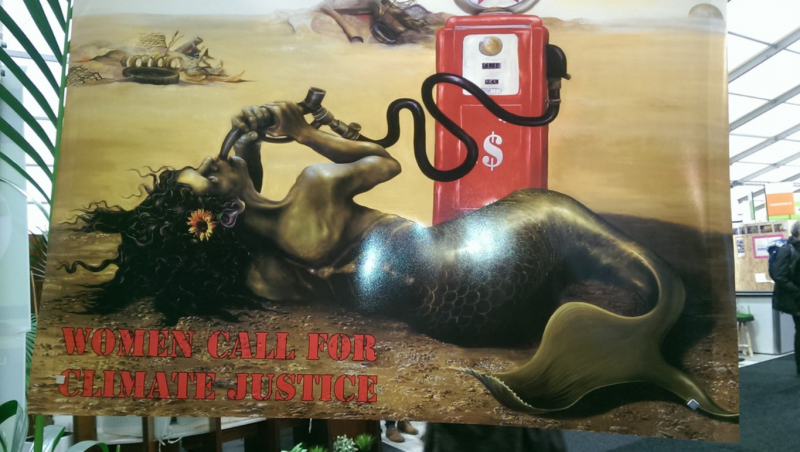
Patriarchal systems challenged and movement building is key
While providing new opportunities in terms of alliances and mobilization for women’s rights and climate justice, this systemic struggle is part of a broader context riddled with significant challenges.
Firstly, as mentioned earlier, civil society continues to be marginalized in international decision-making processes, making advocacy more difficult, since efforts must go through national channels. In this regard, the democratic space allowed for civil society participation varies according to State policies, and potential repressive measures against activists is a concern. Also, inextricable from these dimensions, is the patriarchal system that dominates United Nations spaces, States and the domestic sphere, which impede women’s mobilization and deny them the right to be involved in decision-making.
A woman representing the Swaziland Rural Women’s Assembly recounts that the space their group is awarded to voice opinions is dwindling because of the State’s negative perception of their movement, considered to be “revolutionary”. In addition, the patriarchal system requires that husbands of rural women authorize their involvement in this movement. Authorizations are sometimes denied and can also lead to violent backlash against these women. However, despite these challenges, the Swaziland Rural Women’s Assembly now has almost 20,000 members and manages to mobilize rural women around their rights and capacity building, while encouraging women Parliamentarians to speak on their behalf.
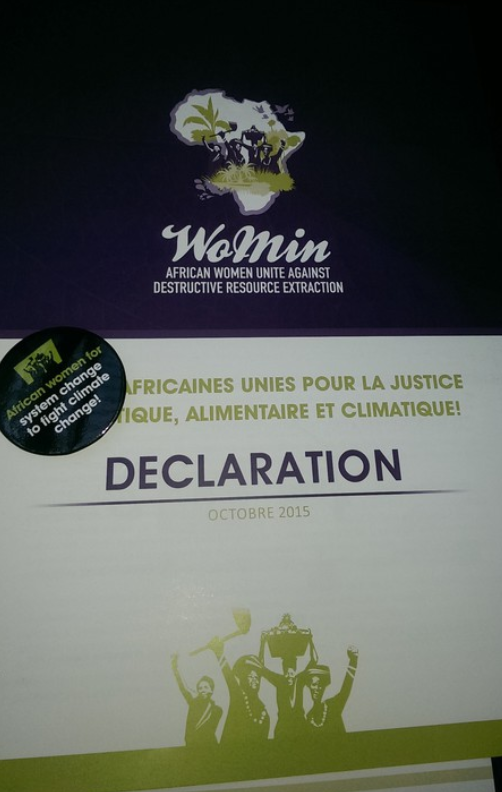
At this point in time, opportunities for alliances between movements and mobilizations for climate justice are more important than ever. The Paris Agreement is certainly unsatisfactory in terms of its content. However by virtue of their plurality and international scope, citizen and civil society mobilizations around this process bring forth new perspectives. After the November 13th Paris region attacks, security measures banned public demonstrations. But it did not prevent activists from forming a human chain, and more than 13,000 pairs of shoes being laid out to symbolize the steps people would have taken had they been allowed to join in the Global March for Climate planned on November 29th in Paris, along with the People’s Climate Summit and other forms of alternative mobilizations. Across the world, more than 780,000 individuals reportedly participated in 2,300 marches for climate justice organized over the weekend of November 28 and 29th to demand that COP 21 produce an ambitious agreement.
New movements were born while marginalized groups were able to speak out, such as “LGBTI pour le Climat”3 (LGBTI for Climate) unprecedented in Paris, as well as feminist activists and artivists, ecofeminists, Afro-feminists, indigenous and rural women… showing that despite diverse backgrounds, alliances and convergence for change are still possible.
In spite of the challenges and frustrations of COP 21, Women and Gender Constituency says: “This agreement has failed to embrace and respond to this moment for urgent and just transitions, but we have not. We have used this space of international policy-making to raise our voices and embolden our movements.”
